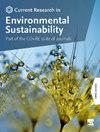基于身份或罪恶感的诉求会导致环境溢出效应吗?
IF 3.8
Q2 ENVIRONMENTAL SCIENCES
Current Research in Environmental Sustainability
Pub Date : 2025-01-01
DOI:10.1016/j.crsust.2025.100294
引用次数: 0
摘要
了解最初的亲环境行为(PEB1)如何以及何时可能溢出以增加或减少后来的PEB1,有助于创建更有效的PEB干预措施。本研究以一种新颖的方式研究了PEB溢出,通过检测诱发身份的先前PEB提醒是否会通过环境身份介导的间接途径增加PEB1向PEB2的正向溢出的可能性,以及诱发内疚的提醒是否会增加通过内疚/羞耻介导的负向PEB溢出的可能性。学生参与者(N = 229)完成了一项纵向研究,在这项研究中,他们暴露在引发内疚、认同或两者都不产生的干预中(对照条件),并被要求使用可重复使用的杯子一周。一周后,他们有机会进行第二次可观察到的PEB(同意给一位政治领导人写信,倡导替代能源)。研究结果为内疚干预后环境认同的正向溢出途径提供了一些证据,但不支持身份干预后环境认同的正向溢出途径,也不支持内疚/羞耻在任何情况下的间接溢出途径。此外,积极的认同路径在积极控制组中很明显,但在非积极控制组中却不明显,这就提出了关于PEB溢出研究中的需求特征的问题。本文章由计算机程序翻译,如有差异,请以英文原文为准。
Do identity or guilt-based appeals lead to environmental spillover effects?
Understanding how and when an initial pro-environmental behavior (PEB1) may spill over to increase or decrease later PEBs can contribute to the creation of more effective PEB interventions. This study investigated PEB spillover in a novel way by examining whether a prior PEB reminder that elicits identity would increase the likelihood of positive spillover from PEB1 to PEB2 through an indirect pathway mediated by environmental identity, and whether a reminder that elicits guilt would increase the likelihood of negative PEB spillover mediated through guilt/shame. Student participants (N = 229) completed a longitudinal study where they were exposed to an intervention eliciting guilt, identity, or neither (control conditions) and were asked to use reusable cups for a week. One week later, they were given an opportunity to perform a second observable PEB (agree to write a letter to a political leader advocating for alternative energy). Results provide some evidence for a positive spillover pathway through environmental identity following a guilt intervention but not an identity intervention and no support for an indirect pathway through guilt/shame for any condition. Additionally, the positive identity pathway was evident in the active control group, but not a nonactive control group, raising questions about demand characteristics in PEB spillover studies.
求助全文
通过发布文献求助,成功后即可免费获取论文全文。
去求助
来源期刊

Current Research in Environmental Sustainability
Environmental Science-General Environmental Science
CiteScore
7.50
自引率
9.10%
发文量
76
审稿时长
95 days
 求助内容:
求助内容: 应助结果提醒方式:
应助结果提醒方式:


